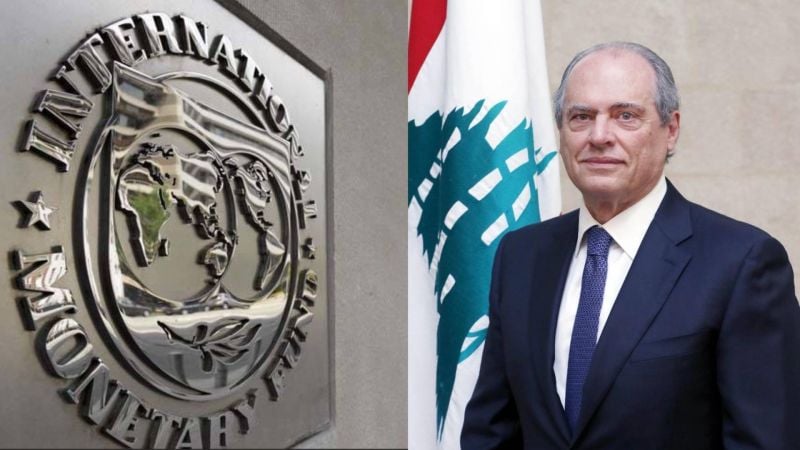
Left: The IMF logo. (Credit: AFP/File photo). Right: Deputy Prime Minister Saade Chami. (Courtesy of Saade Chami's office)
BEIRUT — Though Lebanon “did make progress” on economic reforms required by the International Monetary Fund (IMF) in a staff-level agreement (SLA) two years ago, the country is still not close to meeting its end of the deal to unlock the funds, the official in charge of the negotiations told L’Orient Today on Tuesday.
That limited progress was “not to the extent that would satisfy all prior actions required by the IMF,” said caretaker Deputy Prime Minister Saade Chami, who has been heading negotiations between Lebanon and the IMF.
“With a presidential vacuum, a caretaker government, and the reluctance of Parliament to legislate, I do not expect the implementation of the remaining measures in the next few weeks.”
Two years have passed since Lebanon reached a staff-level agreement (SLA) with the International Monetary Fund (IMF) that would grant the government access to around $3 billion over four years, provided the country undertakes a series of fiscal, financial and monetary reforms set by the international institution.
While nearby Egypt, itself in the midst of an economic crisis, unlocked immediate access to the equivalent of $820 million out of an $8 billion deal with the IMF last March, Lebanon has made little progress on its required reforms.
Amid a lack of political consensus and initiative to undertake the necessary economic and political reforms, Lebanon is in its fifth year of its worst economic crisis, pushing more than half of the population below the poverty line.
Though there is no deadline to implement the IMF-required reforms “it is likely that we will take some time before we satisfy all the requirements to unlock the final deal with the IMF,” Chami told L’Orient Today.
And while Chami said he believed Lebanon made progress in 2023, albeit slowly, he added that the country is now stalling.
In a report published last year, Lebanese think tank The Policy Initiative stated that the “ruling elites had effectively sabotaged the IMF negotiation process.”
Politicians may not be expressing their opposition to the deal blatantly, but it seems like “they want the deal without all the conditions,” Chami said. “But this doesn’t work.”
The “nexus” between some politicians, bankers and the economic organizations in Lebanon is complicating matters and further delaying progress, he added.
Lebanon still lacks major reforms
Many prior actions, or reforms, are yet to be implemented or have been amended in a way that does not meet the IMF requirements (such as the banking secrecy law).
According to Chami, the bank restructuring law and gap resolution law were proposed to Parliament in late 2022 but the finance committee meetings stopped in March 2023. “We took this opportunity to amend and update the two laws, and a draft combining both of them was sent to the council of ministers but has still not been discussed,” he said.
This legislation is needed to rehabilitate the banking sector and kickstart the process of restoring the financial sector to health.
Parliament also failed to implement formal capital control laws. As for the exchange rate, it has mostly been unified (and has been relatively stable for months now, hovering around LL89,500 t0 the dollar), he noted. The rate has become the de facto standard for many fees and taxes in the 2024 state budget, as well as balance sheets for banks in the country. Still, it has not been applied to deposits.
Chami argued that some actions have been out of the Lebanese government’s hands. The failure to initiate an externally assisted bank-by-bank evaluation of the 14 largest banks in the country had less to do with the stalling of the ruling class, and more to do with the fact that Lebanon’s “reputation” has made international firms reluctant to jump on board and do the work.
“The big four audit firms in the world have been contacted, but most of them wanted nothing to do with Lebanon. This is prompting us to look into other alternatives, and this is all very time-consuming,” he said.
Asked if Lebanon still needs the IMF money, two years later, Chami asserted: “We probably need it more than before.”
Chami warned against the high costs and the painful measures associated with moving forward without the IMF deal.“The measures in the SLA benefit the country, and we should be doing them, regardless of whether we have access to the IMF program or not.”
The intended loan of $3 billion may not be a considerable amount given Lebanon’s financial needs, but the deal is set to not only unlock financial aid from the IMF but also serve as a “stamp of approval” to help the country get more aid from international donors, who would otherwise be unwilling to provide financing without Lebanon’s adherence to the IMF program.